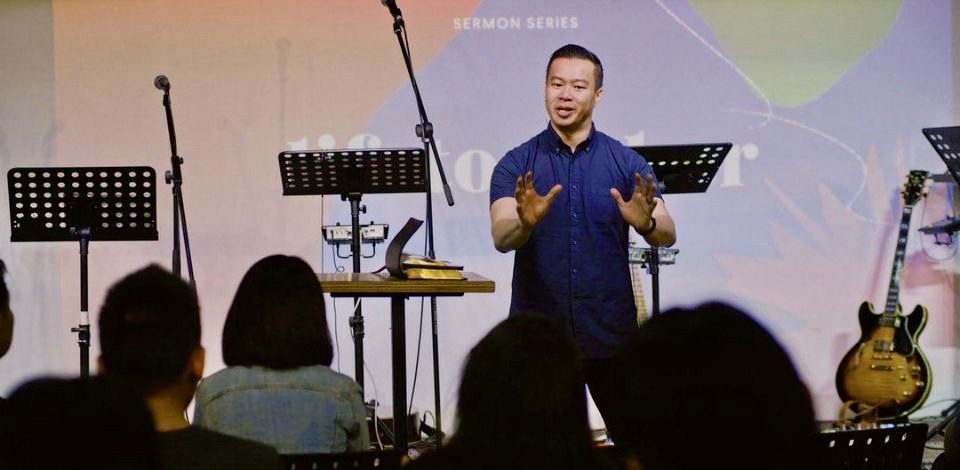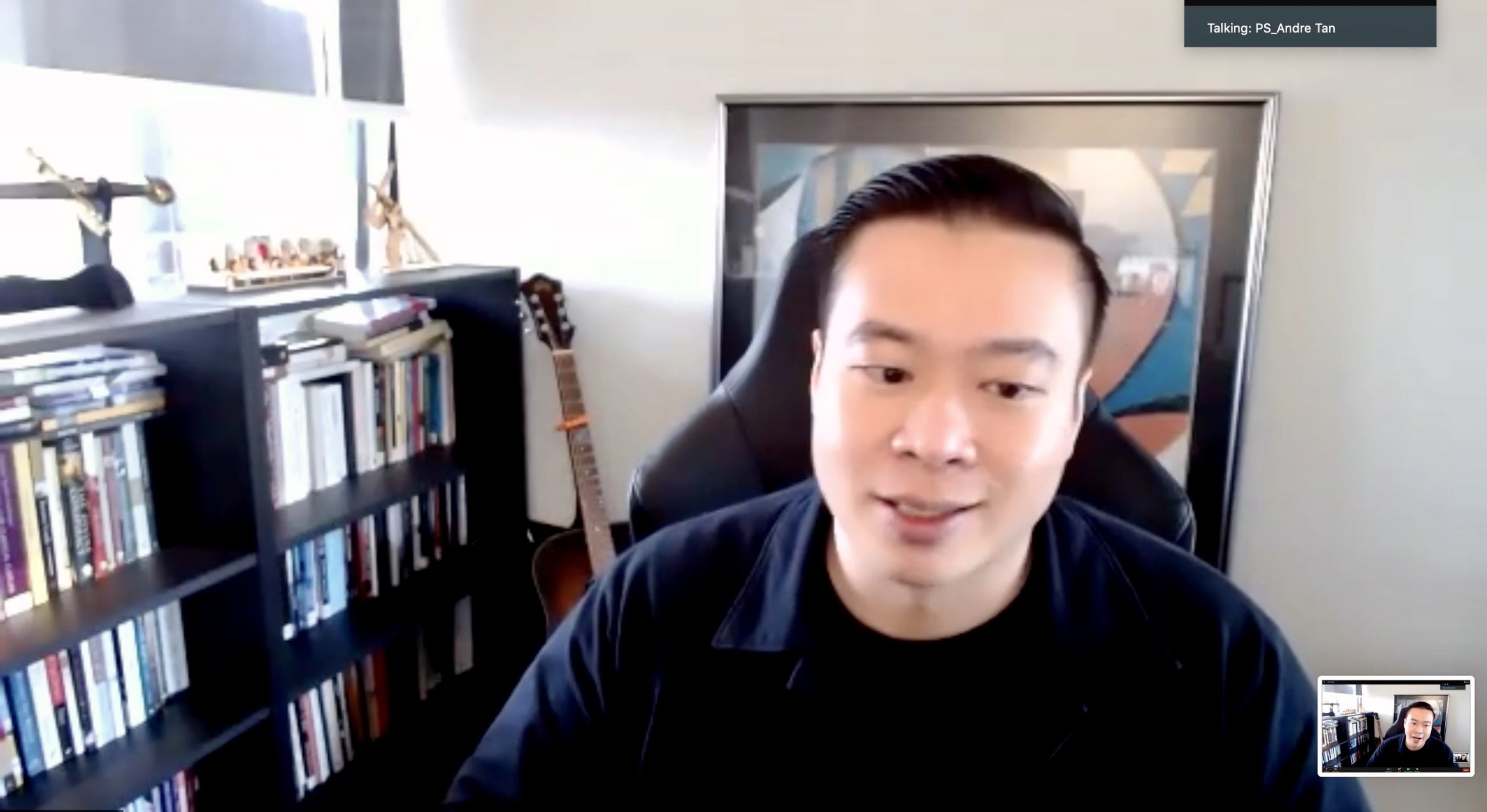“Pastors are not superheroes. We burn out too”: Ps Andre Tan on mental health care of church leaders
TRIGGER WARNING: This story contains material about a suicide that some may find distressing.
Ethel Lim // August 31, 2021, 2:30 pm

"Pastors are expected to be a counsellor, therapist, community organiser, theologian, executive director, CEO – all at the same time," said Andre Tan, lead pastor of The City Singapore. Photo from @thecitysg Instagram.
Pastor Andre Tan was “a baby” when he started pastoring a congregation of 250 at the age of 27.
Young, driven and eager to prove himself, the lead pastor of The City Singapore would be working most nights, ending up with just two to three hours of sleep. His lifestyle became sedentary and his mealtimes irregular. He felt “chronically stressed and anxious”.
I had always associated struggling with something that was incompatible with faith.
He was also newly adjusting to married life at that time.
Ps Andre, now 31, shared his story of pastoral burnout with church leaders and mental health professionals attending the online Christian Mental Health Conference in July.
He answered questions on how the church can better care for the mental health of their leaders (see sidebar at the end of this story).
Ps Andre’s burnout happened during the first year of pastoring his church. Here is what he shared:
Would they lose respect for me?
I remember waking up in the middle of night, my bed completely drenched in sweat because I just had a panic attack. There were moments when I would wake up feeling deathly afraid because I thought my heart was going to beat out of my chest.
I was deeply ashamed that I was struggling.
I lived this life for months.
Even though I knew that all of this was of concern, I did what I thought was right: I buried myself more deeply into work. Because if I were to leave the church, what would happen to them?
I thought to myself: “If people actually knew that I was struggling, would they still have confidence in me as a leader? Would they gradually lose respect for me?”
I was deeply ashamed that I was struggling.
Come to hospital now!
This all came to a head when I started to have a sense that there was something wrong with my body. So I went for a blood test.
The doctor was surprised because my blood work suggested that I would show up delirious and severely weak.
That weekend, I was speaking in church about the power of God and unanswered prayer. We were doing a series on miracles.
After I wrapped up the sermon, my wife came running to me and said: “Your doctor called. He said you have to come to the hospital now.”
I left swiftly for the hospital. The doctor was surprised to see that I was still functioning because my blood work suggested that I would show up delirious and severely weak. It showed that I was at risk of a stroke.
I received a tremendously bad diagnosis that day, and was placed on a whole lot of medication.

Ps Andre Tan. Screenshot from the Christian Mental Health Conference.
I was also trying to reconcile what I had spoken about that morning with what happened to me just an hour later.
It was a really challenging day. And this was in my first year into pastoring.
Scrolling through Facebook
The next day was Monday. And traditionally, Mondays are very challenging days for pastors because you’re coming off the Sunday high.
By sheer provision, I chanced upon an article about a young lead pastor who committed suicide.
I started to battle with a whole lot of negativity. Things really spiralled out of control and I started to contemplate suicide for hours. It wasn’t the first time. I remember moments in my childhood when I had as well, but this was by far the most intense.
It seems irrational, but at that point of time, it felt like the most logical thing to do. Then I thought: “I need to distract myself.”
And so I started to scroll through Facebook. By what I believe was sheer provision, I chanced upon an article about a young lead pastor, roughly about my age. After a prolonged bout of depression, he committed suicide, leaving behind two boys and his wife.
When I read that article. I started to weep and weep. That was something that I did not want to do to my wife.
Putting in the discipline
I wish I could say that all of a sudden I was okay. Even though I managed to step out of that moment, I still struggled.
I had grown up in a tradition that does not have a strong emphasis on mental health and wellness. I grew up hearing sayings like “You don’t burn out, you burn on”. So I had always associated struggling with something that was incompatible with faith.
Our goal of emotional wholeness and mental wellness cannot be separate from our goal of spiritual maturity.
We also strongly believe in God being able to bring change, healing and deliverance in an instant, and I wholeheartedly believe in that, but that was not what happened to me.
I put in the discipline. I started to exercise regularly, and I lost a whole lot of weight. Today I’m off all of my medications, praise God.
I also put in spiritual practices, like observing the Sabbath, which has been really good for my soul. I started seeing a counsellor, and a spiritual director, and also talking to different pastors.
I wish I could say that all things are good now, but I still struggle.
And I read Jesus’ invitation in the Gospel to take on His yoke which is easy, and His burden is light (Matthew 11:28-30), and look at my own life, I often see a stark disparity.
Recalibrating demands
I believe that organisationally, things need to be addressed.
Many pastors leave their jobs because of the lack of support or the inability to cope with unrealistic demands.
Expectations surrounding a pastor’s role can be downright unreasonable, if I may be honest. Pastors are expected to be a counsellor, therapist, community organiser, theologian, executive director, CEO – all at the same time.
I realise that many pastors leave their jobs not because their sense of calling or vocation has changed, but sadly because of the lack of support or the inability to cope with unrealistic demands.
Even though pastors are steeped in spiritual activity – I go to church more than anyone in my congregation – we are not immune to emotional brokenness and mental health challenges. I’ll even go further to say that we are more prone to it. And so our goal of emotional wholeness and mental wellness cannot be separate or distinct from our goal of spiritual maturity.
How can we help our pastors?
Ps Andre Tan answered questions posed by attendees of the Conference. Here is a selection:
How can we change the culture in the church where pastors can only “burn up” and not “burn out”, and we put pastors on a pedestal with no place to fall?
Ps Andre: I think it’s important to see pastors for their humanity as opposed to their utility. As human beings, we all struggle. Someone once said to me that “Struggle defines our common experience”.
And so we need to normalise this – that we all struggle. Even pastors.
It’s important to see pastors for their humanity as opposed to their utility.
There are practical things that we can do. Such as making sure that we don’t have a key man risk with everything leveraged on one person. That is, to have a bit of plurality with leadership. The burden can be damaging and then overwhelming. And many who struggle experience shame.
When I was going through my struggle, a few things happened:
First, people tried to tell me that “It’s not such a big deal, get over it”. Or some people tried to relate by saying, “I have troubles also. Here’s what I am going through.”
But the most painful thing is when people distance themselves from you when you are hurting – not with malice, but because they don’t know how to deal with pain.
So when we learn as a community to better come around people who are hurting, to stand with them, to walk with them, I think it will bring a lot of healing. Not just to the soul, but to the entire culture as well.
Don’t seek help only when something is terribly wrong.
Ps Andre: Seeking professional help has been really nourishing. It has really surfaced a lot of inner dysfunction. I remember asking in the first few sessions: “So when am I going to get fixed?”
I think it’s very easy to satisfy all of your functional roles, even whilst being mentally unsound or emotionally broken. So don’t think that just because you can easily perform the role, you’re emotionally okay.
On Mondays, nobody gets in touch with me. If you really need something, there are good alternative channels of help.
One thing that is needed is regular assessment: Be it a framework, or even sending pastors to see therapists and psychiatrists to assess their emotional well-being. I have discovered the value of a regular assessment for your spiritual state.
Organisationally, having designated people to look after the welfare of pastors is very important. (But we don’t want to run the extreme of having the entire community care for the pastor.)
Put in place a sabbatical policy.
If you are part of a church community and you’re in a leadership role and able to influence the pastor, help the pastor put in place boundaries. The tendency for pastors is to go above and beyond, and the tendency for the congregation is to expect that from their pastor.
We need healthy boundaries in place. So on Mondays, nobody gets in touch with me. And I am not expected to reply. It’s an unspoken rule. If you really need something, there are good alternative channels of help. That serves as a day dedicated to rest.
How much of your situation would you share with the church? How would you deal with the congregation’s expectations of pastors?
Ps Andre: The leaders I had growing up looked to me like superheroes and infallible. Well into my leadership, I thought that that was the kind of leader I had to be. So definitely we can move away from that as leaders, and embrace a certain level of vulnerability, even with our congregants.
With vulnerability, it’s wise to have circles of trust, to have varying degrees of depth into which you go into. There needs to be wisdom and prudence.
I think the Psalms really instructs us well in this tradition of lament, of grieving, of mourning. Some Psalms end well (“Yes, I will praise you”), but some don’t. And I need to have some of those moments with a close circle of trusted friends who can sit with me in my pain.
How can we disciple the church in a more holistic way?
Ps Andre: We talked about church wounding recently in our congregation, and we did a survey polling people about whether they have been wounded in the context of the church environment.
Many of the stories have a common theme: They were struggling or they were spiritually fatigued, and they were pushed to keep going on. They were very wounded by the experience.
Distill it down to the key function and role – biblically – of what a pastor is to do for his people.
They feel like their humanity isn’t seen, and they’re just purely seen for their utility.
One of the things that we can do culturally is to readjust what our priorities are. Are our priorities things getting done? Or are we after people flourishing spiritually?
When Eugene Peterson (best known for The Message transliteration of the Bible) first became a pastor, he was very disturbed by the lack of prayer in his life. He had perceived himself to be always praying for people and caring for souls. But he was just caught up in the organisation of things.
And then he introduced his paradigm for pastoral leadership: That a pastor is primarily a physician of souls. Pastors wear multiple hats these days, but perhaps one of the things that we need to do is to distill it down to the key function and role – biblically – of what a pastor is to do for his people.
I think if we embrace that we are primarily physicians of souls, then it will really be reflected in the way that we interact, and what our priorities are as well.
Is there a need for pastoral staff support groups for better personal soul care in Singapore?
Ps Andre: I think pastorally, we need fewer networks and more friendships. We need settings where we can share honestly and openly.
I think we’re making steps in the right direction, where a lot of groups that I am part of are talking less about attendance, numbers and strategy, but more about family life and how we are doing in the face of challenges.
I advocate for group pastoral counselling. I think that can be really powerful.
STORIES FROM THE CHRISTIAN MENTAL HEALTH CONFERENCE 2021:
How a woman’s struggle with schizophrenia resulted in a medical care portal for the mentally ill
Religion plays a key role in wider mental health blueprint: IMH CEO
We are an independent, non-profit organisation that relies on the generosity of our readers, such as yourself, to continue serving the kingdom. Every dollar donated goes directly back into our editorial coverage.
Would you consider partnering with us in our kingdom work by supporting us financially, either as a one-off donation, or a recurring pledge?
Support Salt&Light



